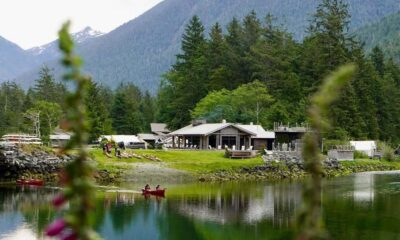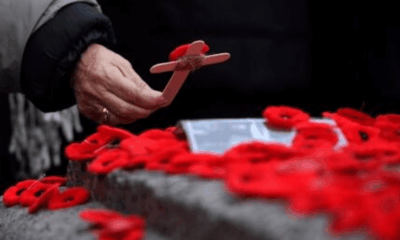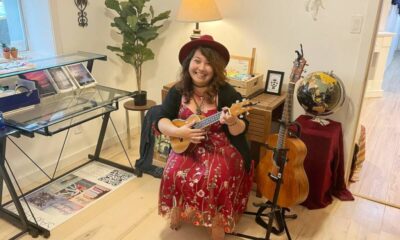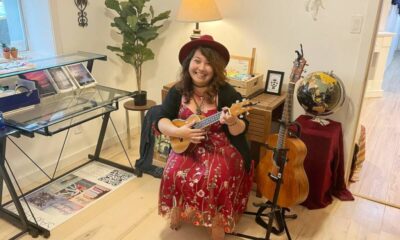Lifestyle
Tseshaht Women Celebrate Successful Elk Hunts, Feed Community
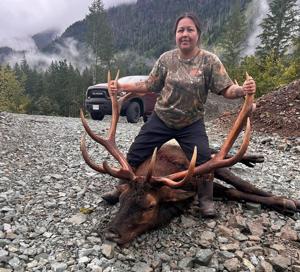
Members of the Tseshaht First Nation, located on Vancouver Island, have recently made significant contributions to their community through successful elk hunts. On September 27, 2023, Leisa Hassall harvested her first Roosevelt elk, a four-by-four bull, in the Comox Main area. Just two days later, on September 29, Sylvia Dick secured a seven-by-seven Imperial bull in the Taylor Arm area. These hunts not only mark personal milestones for the two women but also play a vital role in providing food for their community of approximately 1,267 members.
Hassall, 36, described the spiritual connection she feels during the hunt. “When I harvest animals, I am always thanking the Creator. Being connected to our culture and our traditional prayer is always a meaningful way of grounding ourselves,” she said. Accompanied by her husband, John Morgan Hassall, and her brother, Jordan Dick, she expressed gratitude for the harvest, emphasizing the importance of respect for the animal and the land.
Hassall recounted a valuable lesson learned during her hunt. “I should have been more careful,” she noted, reflecting on her excitement that led her to approach the animal too soon after it was shot. “When you shoot a big animal, it takes longer to die,” she added, highlighting the need for patience and caution in such situations.
Tseshaht First Nation members participate in an elk draw each year, with approximately 30 to 40 members submitting their names for a chance at one of the four available elk tags. The fortunate winners keep half of the meat while the remainder is distributed among community members. Dick, 38, has entered the draw for over a decade, finally receiving her chance this year.
“I had a feeling this year I was going to get picked, and sure enough, I got picked,” Dick said. She described the experience of hunting one of the largest elk she had ever seen as both exhilarating and emotional. “I sat with it until its last breath,” she shared, underscoring the respect she holds for the animals she hunts.
Both women have deep-rooted connections to the traditions of hunting and fishing, having grown up in families that valued these practices. Hassall recalled spending time as a child gathering traditional treats while family members hunted. “We’re already preparing ourselves. We’re going for dips, we’re washing away the negative energy,” she explained, emphasizing the importance of mental and spiritual readiness for the hunt.
The elk harvested by Hassall will provide sustenance for her family for up to three years, consisting of various cuts including steaks, roasts, and burger meat. She described the flavor and quality of the meat as superior, highlighting its leanness and tenderness. “When it’s ground up and you’re making spaghetti or chili, I don’t think people notice the difference,” she said, adding that her children appreciate the traditional food as well.
Dick generously shared the majority of her portion of elk with approximately ten families in her community, reflecting a strong sense of communal responsibility. “I shared my half with people that were close to me. I even gave more than half to the band,” she stated, illustrating her commitment to supporting her fellow community members.
The Roosevelt elk, known as ƛ̓uunim in the Tseshaht language, is the largest land animal on Vancouver Island, weighing over 1,000 pounds. According to the B.C. Ministry of Forests, Lands and Natural Resource Operations, the elk population is currently stable to increasing, with aerial surveys estimating between 5,600 to 6,300 individuals on the island.
While the population remains stable, the elk face threats from unregulated hunting, predation, and habitat degradation. Climate change is also a concern, as severe winters could lead to increased mortality rates among the elk.
Both Hassall and Dick expressed eagerness for future hunts, although they will not be eligible to participate in next year’s draw due to Tseshaht regulations prohibiting consecutive wins. Their successful hunts serve not only as personal achievements but as inspirations for other women in the Nuu-chah-nulth community to engage in traditional practices. “There aren’t a lot of Nuu-chah-nulth women who hunt, and I hope our stories inspire them to try,” Dick remarked, emphasizing the importance of cultural heritage and community involvement.
-

 Politics1 week ago
Politics1 week agoSecwepemc First Nation Seeks Aboriginal Title Over Kamloops Area
-

 World4 months ago
World4 months agoScientists Unearth Ancient Antarctic Ice to Unlock Climate Secrets
-

 Entertainment4 months ago
Entertainment4 months agoTrump and McCormick to Announce $70 Billion Energy Investments
-

 Lifestyle4 months ago
Lifestyle4 months agoTransLink Launches Food Truck Program to Boost Revenue in Vancouver
-

 Science4 months ago
Science4 months agoFour Astronauts Return to Earth After International Space Station Mission
-

 Technology3 months ago
Technology3 months agoApple Notes Enhances Functionality with Markdown Support in macOS 26
-

 Top Stories1 month ago
Top Stories1 month agoUrgent Update: Fatal Crash on Highway 99 Claims Life of Pitt Meadows Man
-

 Sports4 months ago
Sports4 months agoSearch Underway for Missing Hunter Amid Hokkaido Bear Emergency
-

 Politics3 months ago
Politics3 months agoUkrainian Tennis Star Elina Svitolina Faces Death Threats Online
-

 Politics4 months ago
Politics4 months agoCarney Engages First Nations Leaders at Development Law Summit
-

 Technology4 months ago
Technology4 months agoFrosthaven Launches Early Access on July 31, 2025
-

 Top Stories3 weeks ago
Top Stories3 weeks agoFamily Remembers Beverley Rowbotham 25 Years After Murder



